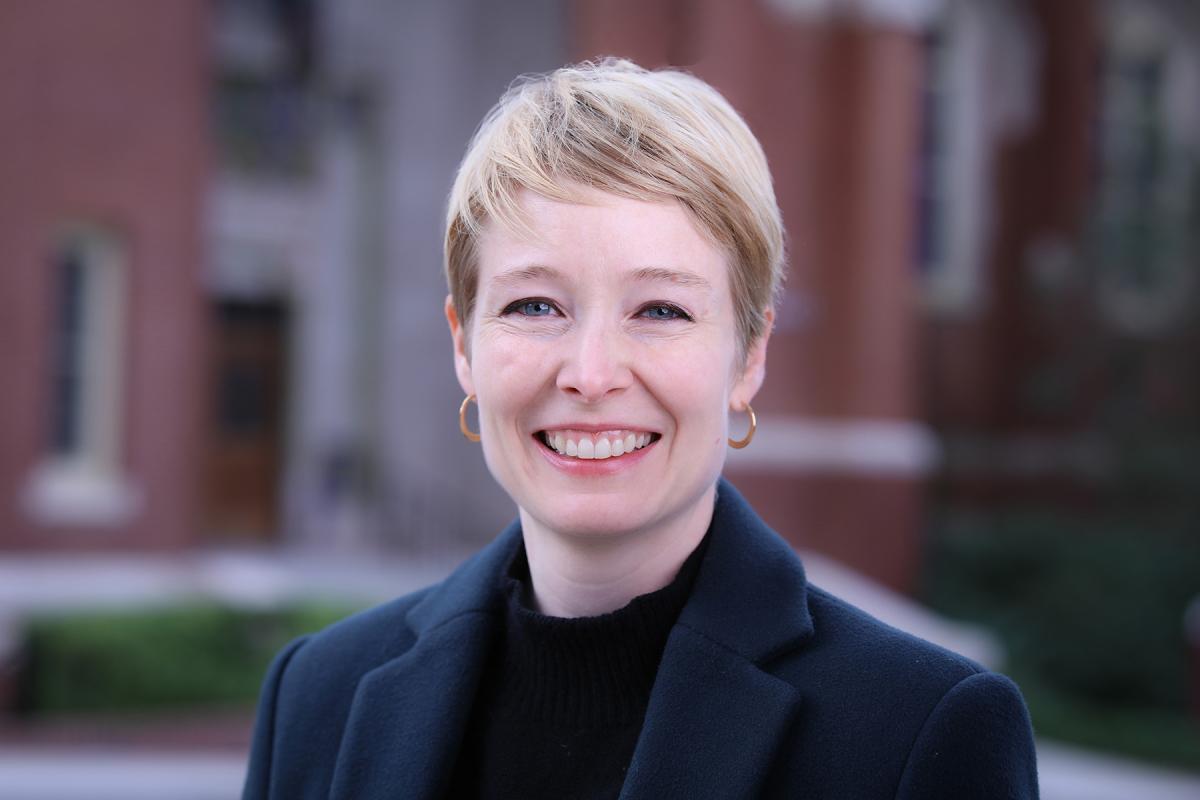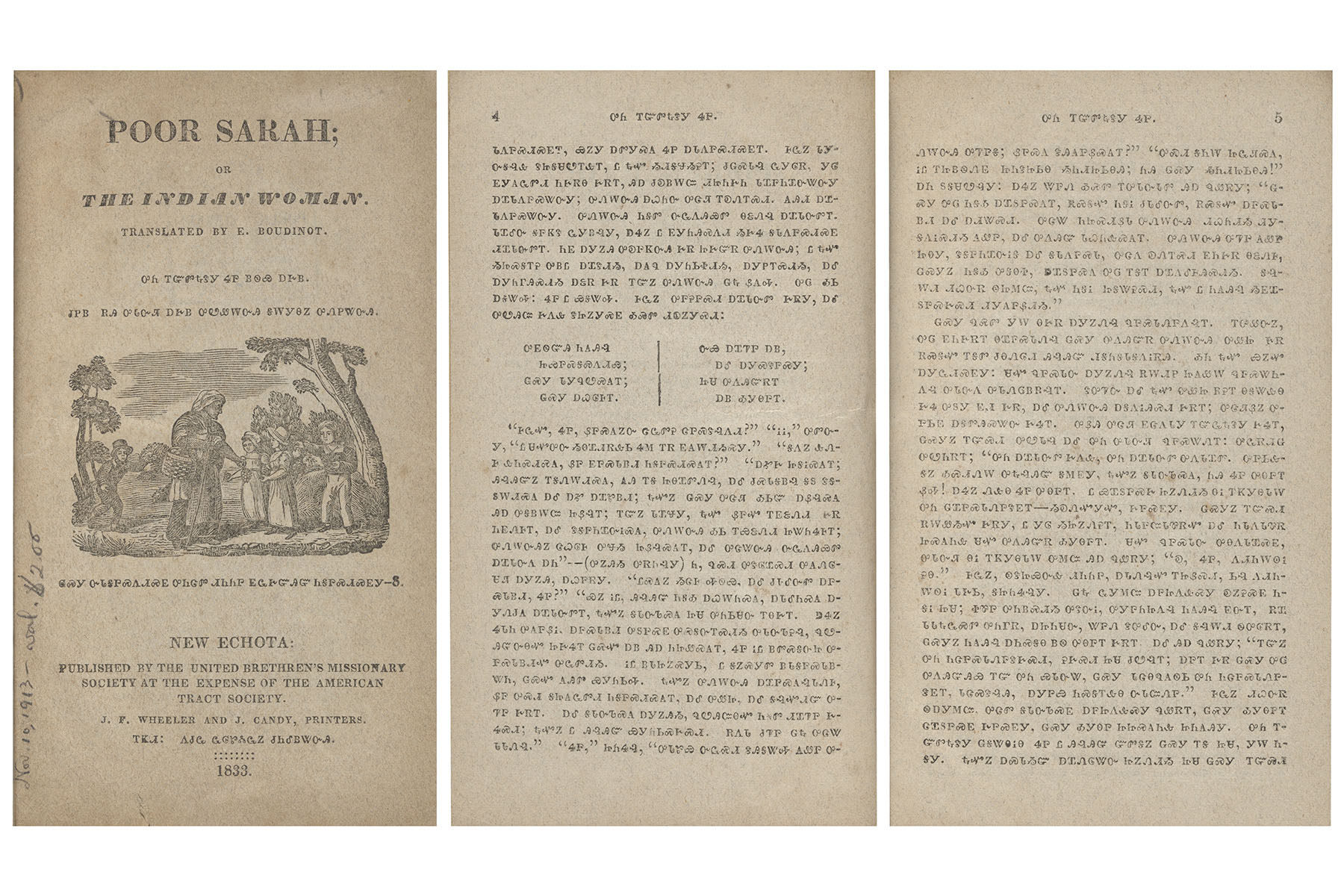FSU professor awarded prestigious fellowship to study Indigenous religious history and texts

A Florida State University scholar of religious studies has earned a prestigious fellowship from the National Humanities Center (NHC) to research the development of early print culture among the Cherokee Nation in the U.S. and an original writing system they created during the 19th-century.
Sonia Hazard, assistant professor of American religious history, was awarded a year-long fellowship to support her project “Christianity and the Book in the Cherokee Diaspora, 1821-1861,” which explores how Cherokee citizens used the printing press to create and distribute religious literature during the forced Cherokee migration of the antebellum period. This work builds upon Hazard’s ongoing research into Indigenous history, language and print culture related to religious movements in the U.S.
“Delight, surprise, gratitude; all those words come to mind when considering my excitement toward this fellowship and its resources to research and write my second book,” Hazard said. “This fellowship comes at a time in which FSU has newly committed to Native American studies by opening the Native American and Indigenous Studies Center last year. This center represents the formalization of something that’s been coming for a long time at FSU: scholarly dedication to the study of and collaboration with Indigenous communities.”
The National Humanities Center, founded in the mid-1970s, is a private nonprofit organization advancing the study in all areas of the humanities. Through NHC’s Residential Fellowship Program, scholars take leave from their normal academic duties to pursue research at the center and are granted resources to generate new knowledge relating to cultural expression and human thought. NHC fellowships are among the most prestigious in the world.
“While I’m looking specifically at religion and print culture in the 19th-century, issues associated with this topic continue to reverberate today; the more I can prioritize Indigenous stories in my scholarship, the better.”
– Sonia Hazard, assistant professor of American religious history and 2024-2025 NHC fellow
Hazard joins more than 1,500 fellows-in-residence from institutions around the globe, representing 45 academic fields. She is among 31 fellows appointed for the 2024-2025 academic year from a pool of 492 applications. Hazard is one of seven FSU researchers to be named an NHC fellow since the center opened for its first group of fellows in 1978.
“It’s not surprising that the NHC has recognized the quality of Professor Hazard’s work,” said Martin Kavka, department chair and professor of religion. “Her research is key to pushing students and scholars to rethink what the study of religion can be. While some think of the study of religion as learning theology or arguing views, Professor Hazard departs from this in thinking about printing and tracts as techniques for performing a religious identity.”
Hazard’s project explores the production and distribution of Cherokee Christian materials in the Cherokee syllabary, a set of written characters representing syllables in the Cherokee language, during the deadly period of struggle caused by the Indian Removal Act of 1830 and what became known as the Trail of Tears.
“It’s important to center Indigenous intellectual contributions, movements and materials since these groups have not always been the focus of scholars,” Hazard said. “This project is a continuation of contextualizing these contributions within the study of U.S. colonialism and its devastation of Indigenous nations. While I’m looking specifically at religion and print culture in the 19th-century, issues associated with this topic continue to reverberate today; the more I can prioritize Indigenous stories in my scholarship, the better.”

By tracing and studying 19th-century Cherokee-printed Bibles, hymn books and other texts to uncover why this religious literature was printed during this time, Hazard will further understand how the Cherokee used these materials and how their meanings changed over time.
“When examining a text, I read the content, but I also look at the binding, style of typography and imagery, how the images and text work together, and if there are any indications of readership or traces of use such as marginalia,” Hazard said. “These sorts of materiality-based methods have been particularly rich when exploring Native American textual materials, especially since many archives of marginalized communities weren’t always considered worthy of preservation; I want every method at my disposal in uncovering Indigenous creativity.”
Hazard earned her doctoral degree in 2017 from Duke University and joined FSU’s faculty in 2019. Her first book “Empire of Print: Evangelical Power in an Age of Mass Media” is slated for publication in 2025 and has been supported by the National Endowment for the Humanities Fellowship at the American Antiquarian Society in 2018, the Mellon/American Council of Learned Societies Dissertation Completion Fellowship in 2017, and the Andrew W. Mellon Fellowship of Scholars in Critical Bibliography at Rare Book School in 2017.
To learn more about Hazard’s research and the FSU Department of Religion, visit religion.fsu.edu. For more information about FSU’s Native American and Indigenous Studies Center, visit nais.fsu.edu.
